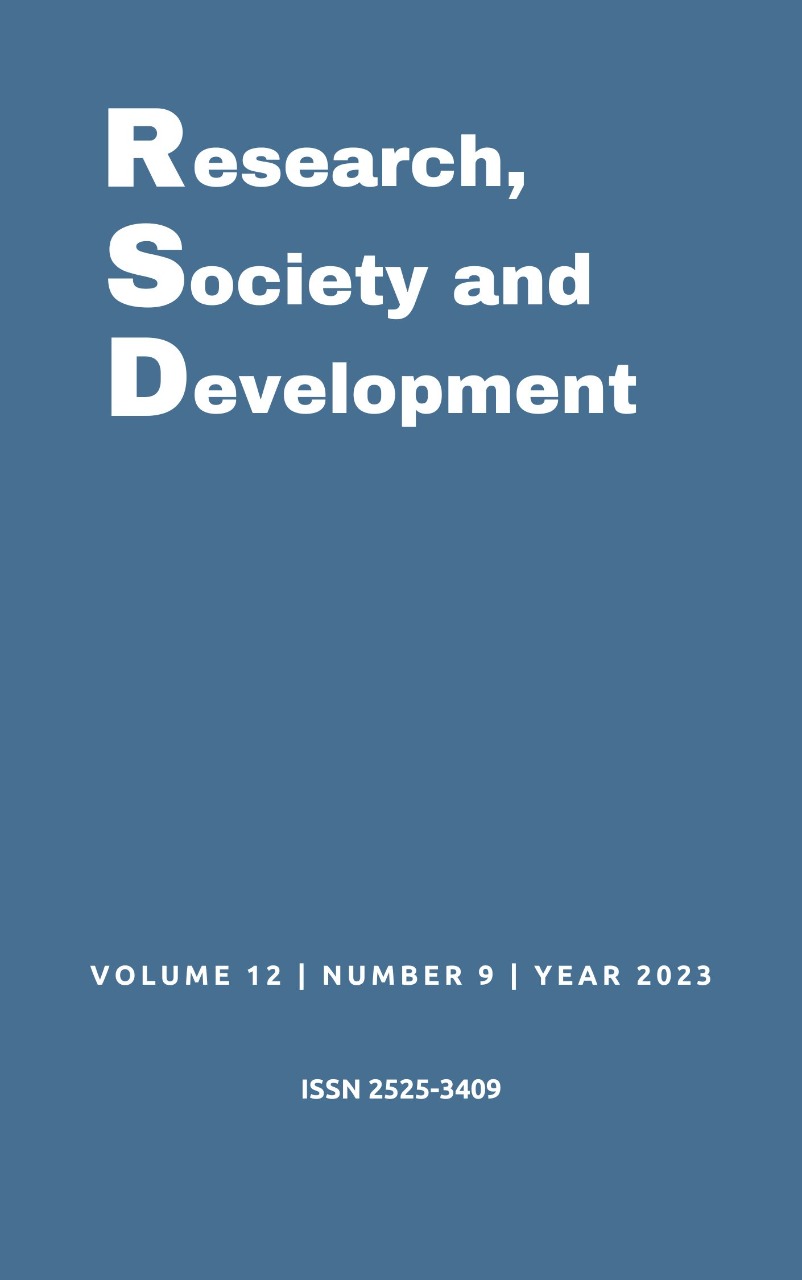Minas Gerais municipalities and their adherence to the National Food Security System – NFSS
DOI:
https://doi.org/10.33448/rsd-v12i9.43345Keywords:
Food security, NFSS, Human Rights, Dignity, Municipalities, Minas Gerais.Abstract
The present study seeks to carry out a survey of the municipalities in Minas Gerais that have joined the National Food Security System – NFSS, as a way of guaranteeing the human right to adequate food for their population. For this purpose, a search was carried out in the legislation that deals with the subject, as well as consultation in the information resources made available by the Brazilian and Minas Gerais state governments. The results showed low adherence by municipalities, a worrying fact, since this adherence is an effective instrument to guarantee this right enabling the maintenance of human life with dignity.
References
Bezerra, I., & Paula, N. F. (2021). Sistemas alimentares sustentáveis e saudáveis: diálogos e convergências possíveis. Faz Ciência, 23(37), 12 –33. https://doi.org/10.48075/rfc.v23i37.27021
Brasil (1988). Constituição da República Federativa do Brasil de 1988. Brasília, DF. Presidência da República.
Brasil (1992). Decreto nº 678, de 06 de novembro de 1992. Atos Internacionais. Convenção Americana sobre Direitos Humanos (Pacto de São José da Costa Rica), de 22 de novembro de 1969. Promulgação. Brasília, DF. Presidência da República.
Brasil (2002). Decreto nº 4.463, de 08 de novembro de 2002. Atos Internacionais. Declaração de Reconhecimento da Competência Obrigatória da Corte Interamericana de Direitos Humanos, sob reserva de reciprocidade, em consonância com o art. 62 da Convenção Americana sobre Direitos Humanos (Pacto de São José), de 22 de novembro de 1969. Promulgação. Brasília, DF. Presidência da República.
Brasil (2006). Lei nº 11.346, de 15 de setembro de 2006. Cria o Sistema Nacional de Segurança Alimentar e Nutricional – SISAN com vistas em assegurar o direito humano à alimentação adequada e dá outras providências. Brasília, DF. Presidência da República
Brasil (2010). Decreto nª 7.272, de 25 de agosto de 2010. Regulamenta a Lei no 11.346, de 15 de setembro de 2006, que cria o Sistema Nacional de Segurança Alimentar e Nutricional - SISAN com vistas a assegurar o direito humano à alimentação adequada, institui a Política Nacional de Segurança Alimentar e Nutricional - PNSAN, estabelece os parâmetros para a elaboração do Plano Nacional de Segurança Alimentar e Nutricional, e dá outras providências. Brasília, DF. Presidência da República.
Brasil (2023). Lei nº 14.628, de 20 de julho 2023. Institui o Programa de Aquisição de Alimentos (PAA) e o Programa Cozinha Solidária; altera as Leis nºs 12.512, de 14 de outubro de 2011, e 14.133, de 1º de abril de 2021 (Lei de Licitações e Contratos Administrativos); e revoga dispositivos das Leis nºs 11.718, de 20 de junho de 2008, 11.775, de 17 de setembro de 2008, 12.512, de 14 de outubro de 2011, e 14.284, de 29 de dezembro de 2021. Brasília, DF. Presidência da República.
Campelo, T (2011). Plano Nacional de Segurança Alimentar e Nutricional 2012-2015. Câmara Interministerial de Segurança Alimentar e Nutricional. Brasília, DF: CAISAN. 132 p.; 27 cm.
Campello, T., Nascimento, R. C., Martins, A. P. B., & Yamaoka, M. (2022). Novas geografias: atuais e antigos dilemas da fome. Segurança Alimentar E Nutricional, 29(00), e022006. https://doi.org/10.20396/san.v29i00.8670346
Fontolan, M. V., & Lima, R. D. S. (2021). Direito humano à alimentação adequada: uma visão holística 1. Faz Ciência, 23(37), 79–107.
Fontolan, M.V. & Lima, R.D.S. (2022). A dimensão étnico-racial do Direito Humano à Alimentação Adequada. Research, Society and Development, 11(11), e300111133649.
Minas Gerais (2017). Lei nº 22.806, de 29 de dezembro de 2017. Dispõe sobre a Política Estadual de Segurança Alimentar e Nutricional Sustentável - Pesans – e organiza o Sistema Nacional de Segurança Alimentar e Nutricional – SISAN – no âmbito do Estado. Diário Oficial. Minas gerais. Governo do Estado.
Minas Gerais (2019). Plano Municipal de Segurança Alimentar e Nutricional de Belo Horizonte/MG. https://social.mg.gov.br/a-sedese/seguranca-alimentar.
Minas Gerais (2018). Plano Municipal de Segurança Alimentar e Nutricional de Ribeirão das Neves/MG. https://drive.google.com/file/d/1vpFzOn_mjaxLjQm7vmrT9jHStb0-3ywv/view.
Minas Gerais (2018). Desenvolvimento social. Segurança Alimentar e Nutricional, MG. https://social.mg.gov.br/a-sedese/seguranca-alimentar.
Nações Unidas (2021). Relatório "O Estado da Segurança Alimentar e Nutrição no Mundo (SOFI)". Food and Agriculture Organization of the United Nations. 240p, https://www.fao.org/documents/card/en/c/cb4474en
Pereira A. S. et al. (2018). Metodologia da pesquisa científica. UFSM. https://www.ufsm.br/app/uploads/sites/358/2019/02/Metodologia-da-Pesquisa-Cientifica_final.pdf.
Rede PENSSAN, R. B. de P. em S. e S. alimentar e N. –R. (2022). II VIGISAN: Inquérito Nacional sobre Insegurança Alimentar no Contexto da Pandemia da Covid - 19 no Brasil. Fundação Friedrich Ebert. Rede PENSAAN.
Seidl (2023). Cartilha de Orientação - Adesão municipal ao Sistema Nacional de Segurança Alimentar e Nutricional – SISAN. http://social.mg.gov.br.
Valente, F. L. S. (2016). Rumo à Realização Plena do Direito Humano à Alimentação e à Nutrição Adequadas. FIAN Brasil.
Downloads
Published
Issue
Section
License
Copyright (c) 2023 Patrícia da Costa Rodrigues; Marielle Rezende de Andrade

This work is licensed under a Creative Commons Attribution 4.0 International License.
Authors who publish with this journal agree to the following terms:
1) Authors retain copyright and grant the journal right of first publication with the work simultaneously licensed under a Creative Commons Attribution License that allows others to share the work with an acknowledgement of the work's authorship and initial publication in this journal.
2) Authors are able to enter into separate, additional contractual arrangements for the non-exclusive distribution of the journal's published version of the work (e.g., post it to an institutional repository or publish it in a book), with an acknowledgement of its initial publication in this journal.
3) Authors are permitted and encouraged to post their work online (e.g., in institutional repositories or on their website) prior to and during the submission process, as it can lead to productive exchanges, as well as earlier and greater citation of published work.


